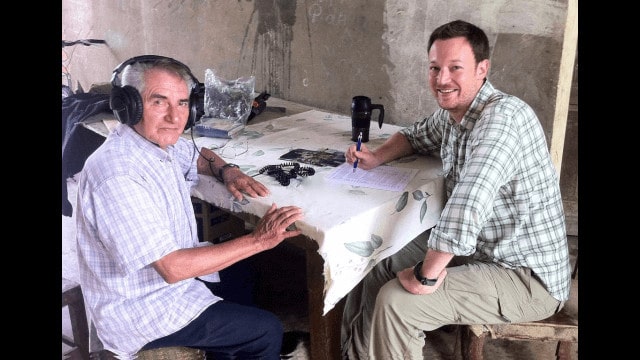A new study of a remote Amazonian farming and foraging community suggests that musical tastes are cultural in origin rather than “hard-wired” in the brain.
One of the authors of the study, published as the cover story in the leading multidisciplinary science journal Nature, is Alan Schultz, Ph.D., M.P.H., assistant professor of anthropology in Baylor’s College of Arts & Sciences.
Schultz and researchers from MIT and Brandeis University traveled to Tsimane’ territory in Bolivian Amazonia to conduct their research. They asked the rainforest participants to listen to two types of chords — dissonant and consonant.
Most participants from the rainforest rated dissonant and consonant sounds about the same.
But a comparison group of westerners preferred the combination of notes in the chords of C and G — often heard in pop music — and generally considered dissonant notes as “clashing.”
To validate the study, researchers asked more than 100 Tsimane’ respondents to rate the pleasantness of various sounds — among them laughter, cries and gasps. The Tsimane’ responses then were compared to those of American musicians and non-musicians; residents of the Bolivian capital of La Paz; and Spanish-speaking Bolivians who live in a small town near the Tsimane’.
All groups rated the sounds similarly, except when it came to music. Preferences for consonance were progressively lower in groups with less exposure to western music and the Tsimane’ alone reported no consonance preference whatsoever. The results strongly support the conclusion that culture plays a determinant role in the development of musical preferences.
Schultz noted that the Tsimane’ for the most part perform music solo, whether singing or playing an instrument such as the flute, rather than in pairs or groups. Many of their songs deal with nature and their lifestyle, with such subjects as spider monkeys, trees and foraging.
More information on the study can be found in this video story. Sound clips are available here.
Other researchers were Josh McDermott, Ph.D., the Frederick A. and Carole J. Middleton Assistant Professor of Neuroscience in the Department of Brain and Cognitive Sciences at Massachusetts Institute of Technology; Ricardo Godoy, Ph.D., professor of international development at Brandeis University; and Eduardo Undurraga, senior research associate at Brandeis’ Heller School for Social Policy and Management.

